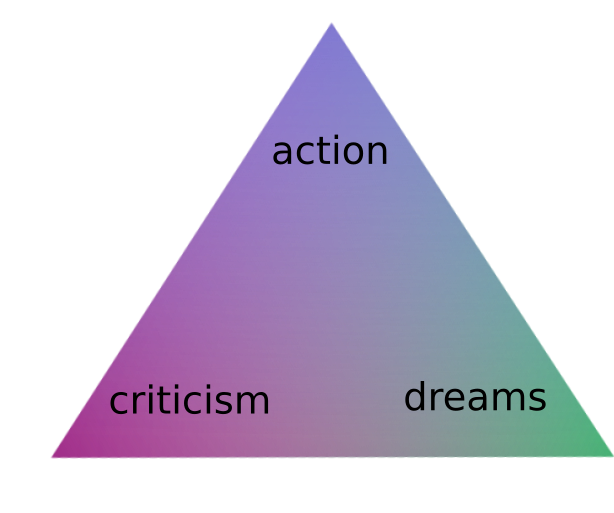The process of changing the world has 3 interrelated parts:
-
Acknowledge where we are
-
Define where we want to be
-
Take steps to move in the right direction
In this essay I want to go into why it’s important to remember that all 3 parts have a place and not to let 1 part dominate the others.
Criticism: acknowledging where we are
Some academics and activists will focus themselves particularly on the first point, drawing much needed attention to the dire consequences of the existing racist, exploitative systems that we deal with every day. Without this type of criticism, we could never hope to understand our world well enough to change it for the better.
But what happens if criticism is all we have. Then when would we ever find ways to actually fix things?
Dreaming: defining where we want to be
Beautifully imaginative stories about our possible futures are so important. This can take the form of utopian visions of a collective society (eg solarpunk) or novel democratic or economic models from academics (eg UBI).
But it can also be a problem to have too much utopian theorizing in the absence of our current lived reality.
Action: taking steps to move in the right direction
To change the world, we have to take the tangible steps to ameliorate our current condition and actualize our ambitious goals. This can take the form of small-scale personal habits or directly spearheading major policy changes. Although many actions will fail, collectively following through to make those changes is what results in substantive changes in the way our world functions.
But this is still just one equally important part of the process. It’s important to not get too fixated on tangible steps because sometimes this process-focus can cause changes that feel useful to morph into a spinning hamster wheel that can actually be counterproductive and burn us out.
Goal: find balance
This post is an attempt to warn members of the leftist movement that they can sometimes seem focusing too much on one part of the process at the detriment of others. As one example, I sometimes see leftists get so addicted to hot takes that they forget to mention any solutions to the problems they see. Other times, I might see someone spending a lot of time articulating imagined perfect utopias without acknowledging the gap between those suggestions and .
This isn’t to suggest that those things should all be avoided, but just to keep in mind not to take any one of them too seriously on its own all the time.
Practicing Balance
Thus far in this essay, I’ve only focused on criticizing the way I see the left acting (how ironic!). To heed my own advice I’m going to make a suggestion for incremental actions that we can all take to keep this balance. And during this next week, I’ll actively put these into practice to try to develop these habits.
1. Assess which parts you favor
While we’re thinking about it, lets take a personal inventory.
-
Do you often find yourself myself on social media writing posts trashing billionaires?
-
Do you spend a lot of time reading econ experiments tested in the lab and extrapolated to hypothetical global economic systems?
-
Do you spend all of your time signing petitions, canvassing for politicians, or researching which non-profit to donate to>
There are many ways to focus on criticism, dreams, or actions. Take stock of where you think you’d fall on this diagram.

Is this the right balance you intend to have?
2. Measure and shift
Over the next few days, lets take special note of which activities we’re engaging in most. And if you feel yourself drawn to engage in something you automatically favor, try to redirect that time to something you normally avoid. Some examples:
-
If you normally spend 1 hour reading Marxist criticism, try spending 30 minutes researching collectivist economic theories like those of Elinor Ostrom as well.
-
If you spend every weekend taking direct action, try spending one evening watching some #leftist TikToks.
At the end of the week compare how you spent your time on the diagram above. Were you closer to the balance you think is ideal for you?
3. Relate to friends
Finally, try relating your understanding of your own balance to others in your social circles. Try to take the approach where you are not criticizing them, but just trying to help them achieve their goals. Some examples:
-
If you have a friend who is always hard at work campaigning, encourage them to imagine their ideal world and see if they can map out how their actions are taking them in that direction.
-
If you see an influencer repeatedly slamming corporations, send them a message asking what actions are they taking in their daily life to fight corporate power.
Remember to be polite and come from a place of respect and helpfulness. Respect everyone’s hard work and try to bring joy and positive reflection with this effort.
Feel free to share this article if it inspires you to reassess your balance in advocating for a more equitable world. And never be afraid to learn more and change approach to meet your goals. That’s what leftwardism is all about.
 will stedden
will stedden